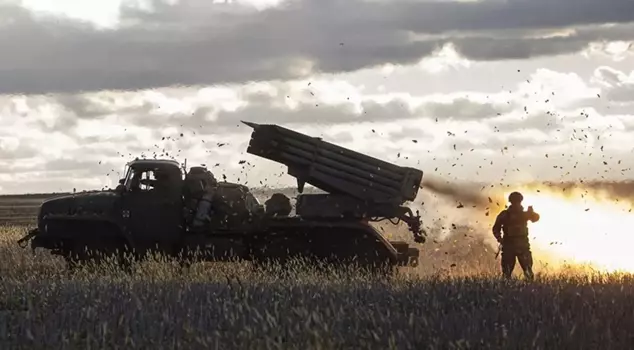
29.11.2024 17:50
The ongoing war and increasing tensions between Russia and Ukraine have sparked deep fear in Europe. Europeans, fearing that the war might spill over to them, have started to take precautions. In Europe, an application has been developed to help people find the nearest shelter in case of a possible attack, while survival brochures have been distributed in Sweden and Finland, which are right next to Russia. This method was also used during the Second World War.
The increasing tension between Russia and Ukraine and the mutual ballistic missile attacks have brought deep concern to Europe. European countries are providing advice on how to build shelters, stock food, and live without electricity through brochures they have prepared in case the worst happens.
Germany is developing an application to help people find the nearest shelter in the event of an attack. Sweden is distributing a 32-page brochure titled "What to Do If a Crisis or War Comes." Half a million Finns have already downloaded an emergency preparedness guide.
"EVERYONE MUST DO THEIR PART"
Russia's invasion of Ukraine has significantly increased security tensions in the Baltic region and has encouraged Finland and Sweden to abandon decades of non-alignment policies and join NATO. However, military capacity is not everything: citizens also need to be prepared. The preface of the Swedish brochure states, "We are living in uncertain times. Armed conflicts are currently taking place in our region of the world. Terrorism, cyber attacks, and disinformation campaigns are being used to weaken and influence us." The brochure, which is also available in English, emphasizes that "collective resilience" is essential and that in the event of an attack on Sweden, everyone must do their part to defend Sweden's independence and democracy, stating that everyone is part of Sweden's overall emergency preparedness.
"USING THE TOILET WHEN THERE IS NO WATER"
According to a report in The Guardian, Swedes have long been familiar with such public information brochures. The first of these was published during World War II.
The latest one provides advice on various topics, including warning systems, air raid shelters, digital security, and how to use the toilet when there is no water.
It is also recommended to keep a good supply of water at home (and to check every year whether the water is still safe), to have plenty of blankets, warm clothing, and alternative heating systems, to purchase a battery-operated radio, and to stockpile a good amount of energy-rich, quick-to-prepare food.
IODINE TABLETS AGAINST NUCLEAR THREATS
Norway's Directorate for Civil Protection (DSB) has distributed a similar booklet to 2.6 million households in the country. The booklet contains statements such as "we live in an increasingly turbulent world" affected by climate change, digital threats, and "worst-case scenario war actions."
The Norwegian brochure advises people to keep at least a week's worth of non-perishable food, such as "crispbread, canned legumes and beans, canned sandwich spreads, energy bars, dried fruit, chocolate, honey, biscuits, and nuts."
Norway also advises its residents to stockpile essential medicines, including iodine tablets in case of a nuclear accident, and like Sweden, recommends that people have several bank cards and keep cash at home.
"WAIT CALMLY FOR INSTRUCTIONS"
In Finland, a comprehensive online guide called "Preparedness for Events and Crises" offers residents information and advice on everything from water shortages to forest fires, internet outages, or "long-term crises like military conflict."
More practically, a separate website called 72tuntia.fi asks citizens of Finland, which shares a 1,340 km border with Russia, "Can you survive for 72 hours in a series of crisis situations?" and invites them to put both their skills and supplies to the test.
The site provides tips on enhancing the ability to cope with difficult conditions, strengthening psychological resilience, improving personal cybersecurity, and sheltering indoors: "Close doors and windows. Turn on the radio. Wait calmly for instructions."
480,000 SHELTERS FOR 84 MILLION
Meanwhile, following an official estimate that Germany has fewer than 600 public shelters that can accommodate only 480,000 people in a country of 84 million, the focus has shifted to increasing the number of shelters and protective accommodations.
Many Cold War shelters have been dismantled under the assumption that they would no longer be needed, but Berlin is now launching a national shelter plan, including a geographic location tracking phone application, under the Federal Office for Civil Protection.
Experts predict that an attack from Russia could occur within the next five years.
Therefore, efforts have begun to search for any structures that could be used in such a situation, including basements of metro stations, government offices, schools, and municipal buildings.
CONTRACTORS WILL BE OBLIGATED
While German households are encouraged to adapt their pantries, garages, or storage areas or to dig up old shelters, contractors will also be legally required to add secure shelters to new homes, as Poland is already doing.
This month, the Frankfurter Allgemeine newspaper revealed details of a thousand-page military document aimed at German businesses, which includes civil preparedness recommendations for individuals, such as training additional truck drivers.